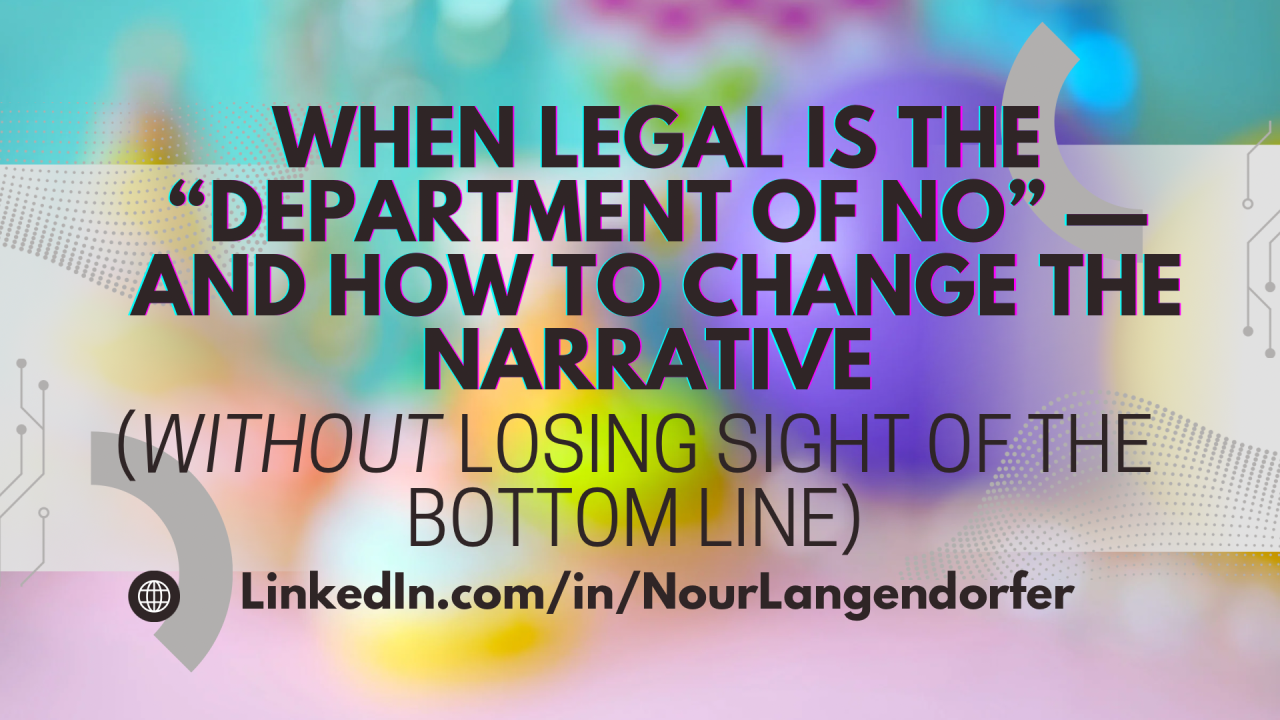There’s a persistent misconception that legal teams exist to block ideas, slow things down, and throw cold water on every ambitious business plan. We’re the infamous “Department of No,” the ones who swoop in with redlines, concerns, and worst-case scenarios just when everything’s about to take off.
But here’s the thing: we’re not in the business of saying “no” for the sake of it. We’re in the business of making money, just like everyone else. Our role isn’t to stop the company from succeeding — it’s to make sure it succeeds sustainably, without costly lawsuits, compliance disasters, or contractual hand grenades waiting to explode.
In fact, when legal does its job well, we help the company move faster, safer, and more profitably. Let’s break down some classic situations where legal is (unfairly) seen as a roadblock, and how to reframe these moments to show we’re actually part of the team driving success.
“Do we really need an NDA? They seem trustworthy!”
Ah, the optimism. Don’t get me wrong, trust is great, but contracts exist for when trust breaks down. NDAs are the cheapest form of insurance your company can have. It’s not about distrusting your partners; it’s about protecting your hard work and ensuring the deal doesn’t go south six months later when everyone suddenly has a different memory of what was agreed upon.
What You Want to Say:
“Sure, as long as you’re fine with your trade secrets being public knowledge by next week.”
What You Actually Say:
“The NDA is just a quick way to protect both sides and avoid misunderstandings later. It’s not about trust — it’s about keeping things professional.”
“The contract is one page. Can’t you just sign off on it?”
Nothing gives lawyers more anxiety than a one-page contract. If the deal is important enough to require a contract, it’s important enough to spell things out properly. That single page probably omits crucial terms like liability caps, performance standards, or — let’s be honest — any mention of who’s responsible if things go wrong.
What You Want to Say:
“Sure, let’s just leave our company completely exposed and hope for the best.”
What You Actually Say:
“Let me add a few key terms to protect the business. It’s faster to get it right now than to fix it later if something goes wrong.”
“Can’t we just reuse the contract from that other deal?”
Here’s the thing: contracts aren’t one-size-fits-all. What worked for a SaaS deal isn’t going to cut it for a new joint venture or a high-risk partnership. Treating contracts like interchangeable templates might save time up front, but it can cost a fortune later when mismatched terms create legal headaches.
What You Want to Say:
“Sure, let’s just copy and paste and hope it magically works.”
What You Actually Say:
“Let me tailor the language so it fits this specific deal and protects our business interests. A little customization now avoids big risks later.”
“Do we really need to worry about this clause? It’ll never happen.”
Nothing says “famous last words” like dismissing a risk because it seems unlikely. Sure, 99% of the time, it won’t happen. But that 1% scenario? That’s the one that comes with fines, lawsuits, and very awkward conversations with the board.
What You Want to Say:
“I’m glad you’re optimistic, but unfortunately, that doesn’t hold up in court.”
What You Actually Say:
“It probably won’t happen, but if it does, the impact could be huge. Let’s take a minute to address it now and save ourselves the trouble later.”
“Can you approve this contract today? The deadline is 4:00 p.m.”
Nothing says “we’re all in this together” like a last-minute contract review that’s suddenly urgent because someone sat on it for three weeks. And yet, legal is somehow always expected to be the hero who swoops in to fix it in record time.
What You Want to Say:
“Oh, absolutely. Let me just drop everything else and perform miracles.”
What You Actually Say:
“I’ll do my best to prioritize this, but we need to make sure we’re not rushing and missing key risks. Let me flag anything critical so you can decide how to move forward.”
Why Legal Is More Than Just “No”
Here’s the truth: legal isn’t here to stop progress. We’re here to enable it. We don’t say “no” because we love being the bad guys. We say “no” (or, more often, “not like this”) because we want to ensure the company’s success without exposing it to unnecessary risks or costs.
In reality, when we’re included early and treated as partners, we make deals better. We help secure IP rights, manage liabilities, and set up contracts that allow the company to grow without fear of legal disasters. That’s not about slowing things down — that’s about protecting the business’s ability to move forward confidently.
When you’re part of the legal team, your job isn’t just to protect the company — it’s to help it thrive. And when the business sees you as a partner instead of a gatekeeper, that’s when the magic really happens.
Final Thoughts
So, the next time someone grumbles about legal slowing things down, remind them:
- We’re not the Department of No — we’re the Department of Doing Things the Right Way. We’re also the Department of Let’s Not Accidentally Set the Company on Fire.
- Our goal is to make money, not block it.
At the end of the day, we’re just as invested in the company’s success as the sales team, the product team, or the executives. The only difference is, we’re the ones who have to think about what happens if things go wrong.
What’s the funniest or most frustrating “legal roadblock” moment you’ve experienced in-house? Let’s share some laughs — and maybe a few survival tips — in the comments.


Leave a Reply